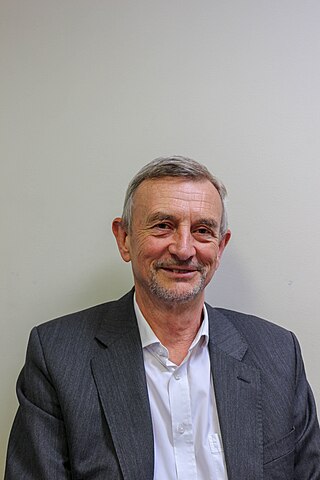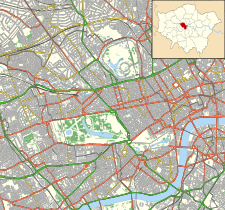
Neurosurgery or neurological surgery, known in common parlance as brain surgery, is the medical specialty that focuses on the surgical treatment or rehabilitation of disorders which affect any portion of the nervous system including the brain, spinal cord, peripheral nervous system, and cerebrovascular system. Neurosurgery as a medical specialty also includes non-surgical management of some neurological conditions.

Sir William Richard Gowers was a British neurologist, described by Macdonald Critchley in 1949 as "probably the greatest clinical neurologist of all time". He practised at the National Hospital for the Paralysed and Epileptics, Queen Square, London from 1870–1910, ran a consultancy from his home in Queen Anne Street, W1, and lectured at University College Hospital. He published extensively, but is probably best remembered for his two-volume Manual of Diseases of the Nervous System (1886, 1888), affectionately referred to at Queen Square as the Bible of Neurology.

Sir David Ferrier FRS was a pioneering Scottish neurologist and psychologist. Ferrier conducted experiments on the brains of animals such as monkeys and in 1881 became the first scientist to be prosecuted under the Cruelty to Animals Act, 1876 which had been enacted following a major public debate over vivisection.
Josemir W. Sander, also known as Ley Sander, is a Professor of Neurology and Clinical Epilepsy, and the head of Department of Clinical and Experimental Epilepsy, at UCL Queen Square Institute of Neurology. He is also a Professor of Neurology at West China Hospital, Sichaun University in Chengdu, China.

Queen Square is a garden square in the Bloomsbury district of central London. Many of its buildings are associated with medicine, particularly neurology.

The Epilepsy Society is the largest medical charity in the field of epilepsy in the United Kingdom, providing services for people with epilepsy for over 100 years. Based in Chalfont St Peter, Buckinghamshire, UK, its stated mission is "to enhance the quality of life of people affected by epilepsy by promoting research, education and public awareness and by delivering specialist medical care and support services." The Epilepsy Society has close partnerships with the National Hospital for Neurology and Neurosurgery and the UCL Institute of Neurology, both located in Queen Square, London.
University College London Hospitals NHS Foundation Trust (UCLH) is an NHS foundation trust based in London, United Kingdom. It comprises University College Hospital, University College Hospital at Westmoreland Street, the UCH Macmillan Cancer Centre, the Royal National ENT and Eastman Dental Hospitals, the Hospital for Tropical Diseases, the National Hospital for Neurology and Neurosurgery, the Royal London Hospital for Integrated Medicine and the Royal National Throat, Nose and Ear Hospital.
The Leslie Oliver Oration is held annually at the Queen's Hospital, London. The lectures are named after Leslie Oliver who founded the Neurosurgical Unit at Oldchurch Hospital in Essex in 1945. In addition, he was one of the early practitioners of functional neurosurgery in the United Kingdom, writing several articles on the surgical management of Parkinson’s disease.

University College Hospital at Westmoreland Street, named The Heart Hospital until refurbished and renamed in 2015, was a specialist cardiac hospital located in London, United Kingdom until 2015. It is part of the University College London Hospitals NHS Foundation Trust and is closely associated with University College London (UCL). After the 2015 refurbishment, the hospital now provides thoracic surgery and urology services.

The UCL Queen Square Institute of Neurology is an institute within the Faculty of Brain Sciences of University College London (UCL) and is located in London, United Kingdom. Together with the National Hospital for Neurology and Neurosurgery, an adjacent facility with which it cooperates closely, the institute forms a major centre for teaching, training and research in neurology and allied clinical and basic neurosciences.
The Mischer Neuroscience Institute is a combined research and education effort between the Vivian L. Smith Department of Neurosurgery and the Department of Neurology at McGovern Medical School at UTHealth Houston and Memorial Hermann Hospital. Located in Houston, the Institute draws patients from around the world for specialized treatment of diseases of the brain and spine. It was the first center in Texas and one of only a few institutions in the country to fully integrate neurology, neurosurgery, neuroradiology, neuro-oncology, spine surgery, pain medicine and neurorehabilitation.

Julius Althaus was a German-English physician. He conducted early electrical treatment of patients at King's College Hospital and he was mainly instrumental in creating the Maida Vale Hospital for Nervous Diseases.

The Maida Vale Hospital for Nervous Diseases was a hospital that existed in west London from 1867 to 1993.

Johanna Chandler was a British orphan who founded a charity and a home for the paralysed which is now the National Hospital for Neurology and Neurosurgery in central London, United Kingdom.
Michael G Hanna is Director of the UCL Institute of Neurology, University College London and professor in clinical neurology and consultant neurologist at the National Hospital for Neurology and Neurosurgery, Queen Square, London, and also Director of the Medical Research Council (MRC) Centre for Neuromuscular Disease.

Thomas Lovell Buzzard was a Victorian English doctor who worked at the National Hospital, Queen Square. He was a pioneering neurologist who founded an epilepsy society and wrote also on Parkinson's disease. One of the last doctors to be trained through the apprenticeship route, Buzzard witnessed the Crimean War and later was a role model for the famous painting The Doctor.
Neuroscience nursing is a distinctive area within the discipline of nursing. It focuses on the care of individuals with brain, spine and nervous system disorders. Neuroscience nurses work in a wide range of settings from academic medical centers to skilled nursing facilities, rehabilitation units to epilepsy monitoring units. Neuroscience nurses can be found in virtually any setting that nurses practice.

Martin Neil Rossor is a British clinical neurologist with a specialty interest in degenerative dementias and familial disease.
Alan J. Thompson is Dean of the Faculty of Brain Sciences at UCL; Pro-Provost for London at UCL; Garfield Weston Professor of Clinical Neurology and Neurorehabilitation at the UCL Queen Square Institute of Neurology. He is also a consultant neurologist at the University College London NHS Hospitals Foundation Trust working at the National Hospital for Neurology and Neurosurgery. He is Editor-in-Chief for Multiple Sclerosis Journal.
Valentine Darte Logue was an Australian-born British neurosurgeon.













